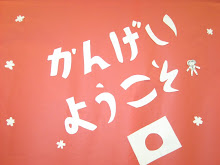Tuesday: September 15, 2009 A Block One Day
JAPANESE 3 -- First period
New review test on verbs will be given Thursday, Sept 14. (Many people had difficulty with the last one.) The re-test will count for twice as many points as the last one. Today students received their tests, and rewrote them completely, with corrections、 in their notebooks.
After answering questions about characters in 3 Kimono (pages 4 and 5), students spoke in Japanese about their summer vacations.
We listened to tape for page 7 in text.
Explanation for talking about kanji:
Kanji compound example –人口
えい語 で いみ は Population という こと です。
かんじ は 「ひと」 の じん と くち の 「こう」 です。
On board:
Group 3 verbs:
かいもの します
すいえい します
じょうば します
さんぽ します
ランニング します
デモ します
サイクリング します
NOT Group 3 verbs:
はなします
かします
New nouns: しごと(Work)、アルバイト(Part-time or temp job)
とまります(Stay over night at hotel or someone’s house)
Kanji: 買います Keep an eye on your shell money when you BUY things
目 Eye
貝 Shell
見 An eye on legs SEES
Homework: a family tree of the Weasley family (from the Harry Potter series), at the time that Harry is 16 years old (i.e., everyone is still alive)
INDEPENDENT STUDY JAPANESE – Third period
Independent Study did not meet today.
JAPANESE 1 – Fifth period
Reading projected sentences:
あきこ Wa こい が Suki Desu. Akiko likes koi (fish).
けん Wa Suupaaman Desu. Ken is Superman.
ですdesu means is/am/are.
Dakuten added to a hiragana results in a character with a “voiced” consonant.
か is pronounced ka, but が is pronounced ga.
こ is pronounced ko, but ご is pronounced go.
Handouts:
1. complete hiragana chart
2. kanji writing page for numbers 1-10
3.
On board results of word dictation
Kouen こうえん
Ike いけ
Ookii おおきい
Koe こえ
.
Re-test was yesterday, Tuesday. Finish handout page (see above) for homework, if you have not finished already.
Sensei checked flash cards for hiragana あ To こ、
And ん。
Homework: STUDY
JAPANESE 2 -- Sixth period
Camille Wright and Ami Sacco started off talking about their なつやすみ、日本語 で。 Their sentences were transcribed and projected on the screen in enlarged characters.
カミールさん の なつやすみ
1. St.Louis {サント・ルイス}に いきました。
2. あたらしい ともだち に
あいました。
3. おなまえ は ゆかりさん です。
4. とうきょう から きました。
5. ゆかりさん は かいもの を しました。
6. アルドズと「あきら」に いきました。
アミさん の なつやすみ
1. ちちゅうかい に いきました。
2. イタリアに いきました。
3. ガイドさん に あいました。
4. おなまえ は マリアさん でした。
5. ローマに すんで います。
6. パスタ は おいしかった です。
Everyone else will write similarly about his or her own summer vacation (Double spaced, numbered) for tomorrow.
Verb retest will take place tomorrow.
Hand out 2Kimono texts tomorrow.
Reminder: We all must be polite in the Japanese language classroom. Not only is it important in our lives in general – it is an essential part of Japanese culture. ください、おねがい します、ありがとう、すみません Are the most important words and phrases in Japanese.
JAPANESE 4 and AP – Seventh period
This class does not meet on Block One days.
About Me

- O.Kimeru
- M.A. 1992 from U. of Chicago; Japan Foundation Fellow in 1987-88; research fellow Yokohama City University; Japanese language teacher since 1991; also taught French (member American Association of Teachers of French), English as a Second Language (to students), methodology of teaching ESL (to Japanese high school teachers), English, Japanese history/culture, drama; in 2002 and 2004, listed in Who's Who Among America's Teachers; member of Chicago Sister Cities Osaka Committee, and chair of its Education Sub-Committee; vice-president Illinois Association of Teachers of Japanese; Payton H.S. World Language Department Chair from 2003-2007, under founding principal Mrs. Gail Ward; taught Japanese and coordinated Japan Exchange at Payton from 2003 to 2010; Japanese teacher at Burr Public School beginning August, 2010
Followers
Blog Archive
-
▼
2009
(146)
-
▼
September
(19)
- September 29, 2009 An Eight Period Day
- September 28, 2009 An Eight Period Day
- September 25, 2009 An Eight Period Day
- Japan Exchange Seminar 2009/09/24
- September 23, 2009 A Block Two Day
- September 22, 2009 A Block One Day
- September 21, 2009 An Eight Period Day
- September 18, 2009 An Eight Period Day
- September 17, 2009 An Eight Period Day
- September 16, 2009 A Block Two Day
- September 15, 2009 A Block One Day
- September 14, 2009 An Eight Period Day
- September 11, 2009 An Eight Period Day
- September 10, 2009 A Block Two day
- September 9, 2009, Wednesday
- September 8, 2009, an Eight Period Day
- Requirements for Kimmel Sensei's Japanese Classes,...
- requirements for Japanese classes, revised Septemb...
- Fall Haiku for the Beginning of School
-
▼
September
(19)